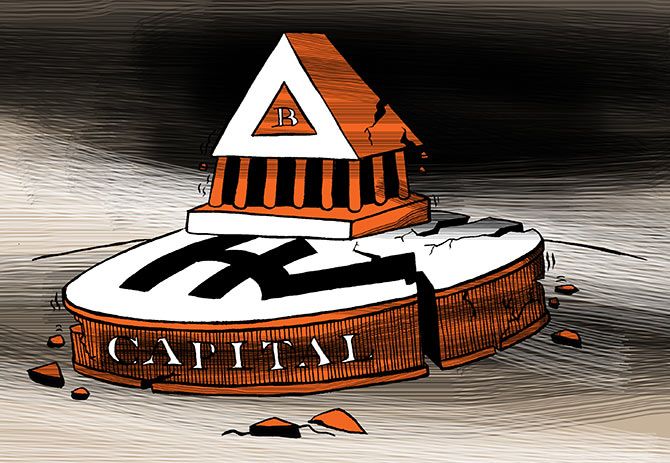The main difference of opinion between RBI and FinMin is over the transfer of the RBI’s ‘excess’ capital reserves.
The Jalan panel seeks to convince finance secretary Subhash Garg to soften his dissent note language.
The move is aimed at maintaining the now-cordial relations between the RBI and the finance ministry.
Illustration: Uttam Ghosh/Rediff.com

Some of the members of the Bimal Jalan Committee - on the central bank’s economic capital framework - are seeking to convince Finance Secretary Subhash Garg to tone down his strong dissent note.
Garg did not attend the last meeting of the panel held on June 24.
The next meeting of the panel will be on July 17.
Expected to be the last such meeting, the panel will submit its report to the Reserve Bank of India (RBI).
Garg is the finance ministry’s representative on the panel.
"The finance secretary’s dissent note focuses on the issue of unrealised gains and whether the transfer of the RBI’s excess capital reserves to the Centre should be made at one go or in a phased manner,” said a person privy to the development.
The move by the other panel members is aimed at maintaining the now-cordial relations between the RBI and the finance ministry, said an official.
“There have been many flashpoints between the two over the past one year.
"With a new governor at the helm, relations have been improving.
"However, the strongly-worded dissent note, in its current form, will likely worsen matters,” the person said.
Text and WhatsApp messages to Garg went unanswered.
The Jalan panel has already delayed the submission of its report twice.
The main difference of opinion within the six-member panel is over the transfer of the RBI’s ‘excess’ capital reserves.
While most panel members are in favour of a phased transfer of the RBI’s capital reserves to the government over the years, the government’s view, voiced by Garg, is for a one-time transfer.
There is also a stalemate among the panel members.
Garg wants the panel to recommend tapping the ‘unrealised gains’ in the revaluation accounts of the central bank, while Jalan is not in favour of it.
One of the hindrances in utilising the ‘unrealised gains’ is that the RBI had passed a board resolution against using it as a part of dividend to the government.
At the end of June 2018, the ‘unrealised gains’ - cited as currency and gold revaluation reserves in the RBI’s balance sheet - accounted for 70 per cent of the central bank’s reserves of Rs 9.6 trillion.
According to another official aware of the developments in the Jalan panel, Garg has been putting forward the government’s view quite aggressively in the meetings he has attended.
“The other members agree that some of the RBI’s reserves need to be shared with the government, but not to the extent that will leave the central bank vulnerable.
"They feel that a strong central bank is good for a stable ecosystem. Stripping it of the entire surplus will not be in the larger national interest,” said the second official.
Other members of the Jalan panel, headed by former RBI governor Bimal Jalan, include former deputy governor Rakesh Mohan, RBI central board members Bharat Doshi and Sudhir Mankad, and Deputy Governor N S Vishwanathan.
This is not the first time Garg has locked horns with the RBI over the issue of the latter’s excess reserves.
In August last year, an internal finance ministry note, originating from the Department of Economic Affairs (which Garg heads), laid out how the government feels it is getting a lower surplus from the RBI, as the central bank is extremely conservative in its assessment of its capital buffers to meet market risks and that the RBI should transfer Rs 3.6 trillion to the Centre.
Three letters sent by the government to the RBI last year, which referred to Section 7 of the RBI Act, were reported to have been drafted by Garg.
The points of contention for which Section 7 was referred to were easing of prompt corrective action norm, concessions for power sector non-performing assets, and transfer of reserves.











